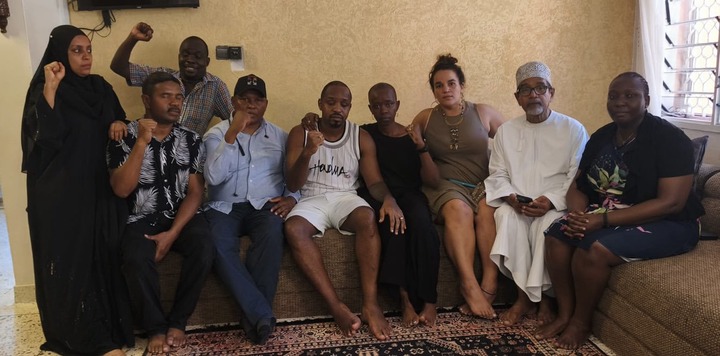Activists and lawyers have claimed that Kenyan activist Boniface Mwangi can barely walk, revealing the ordeal he allegedly endured at the hands of Tanzanian authorities.
Mwangi was arrested in Dar es Salaam while attempting to attend the court hearing of Tanzanian opposition leader Tundu Lissu, who is facing treason charges.
He was detained alongside Ugandan lawyer Agather Atuhaire.
Haki Africa Executive Director Hussein Khalid shared videos and photos on X (formerly Twitter) on Thursday, May 22, 2025, showing Mwangi looking frail and in apparent distress.
Khalid stated that Mwangi had been dumped at the Horohoro border post by Tanzanian security agents on Thursday morning.
“He has been severely tortured and can barely walk. His body is broken, but his spirit remains strong,” Khalid posted.
“We are making arrangements to transfer Boniface Mwangi to Nairobi for medical attention.”
In the photos, Mwangi is seen with his wife, Hellen Njeri and a group of human rights activists who received him in Ukunda.
He was abandoned in Ukunda, Kwale County, approximately 92 kilometres north of the Tanzanian border at Lunga Lunga, after being deported by road from Dar es Salaam.
On Thursday, May 22, 2025, the Kenyan government formally protested Mwangi’s detention, accusing Tanzanian authorities of denying consular access to the detained activist.
Kenya’s Ministry of Foreign and Diaspora Affairs wrote to the Tanzanian government requesting immediate consular access to Mwangi, who had not been seen publicly since his arrest and subsequent disappearance from a Dar es Salaam police station.
The letter, formally known as a note verbale, was made public by Foreign Affairs Principal Secretary Korir Sing’oei on Thursday.
“The Ministry notes that despite several requests, officials of the Government of Kenya have been denied consular access and information regarding Mr. Mwangi. The Ministry is also concerned about his health, overall well-being, and the lack of information about his detention,” the letter stated.
Under the Vienna Convention on Consular Relations, accredited diplomats are entitled to access nationals detained in a host country in order to provide assistance or enable communication with their families.
Kenya noted that denying this access violates international law, to which both Kenya and Tanzania are signatories.
“In light of the above, the Ministry of Foreign and Diaspora Affairs respectfully urges the Government of the United Republic of Tanzania to expeditiously and without delay facilitate consular access to or release Mr. Mwangi, in accordance with international legal obligations and diplomatic norms,” the PS said.
